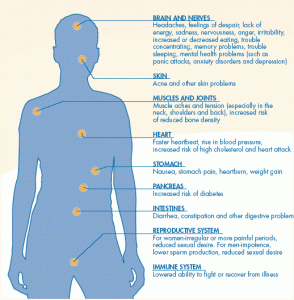The Truth about Stress
 Hormones are chemical messengers that control most major and minor bodily functions. When hormones are in balance the body will thrive but when out of whack a cascade of health problems can ensue.
Hormones are chemical messengers that control most major and minor bodily functions. When hormones are in balance the body will thrive but when out of whack a cascade of health problems can ensue.
Cortisol has been called the Master of all hormones, because abnormal levels can impact so many bodily systems. Normal fluctuations occur over the course or 24 hours according to circadian rhythms. Cortisol is naturally high around 7- 8am in the morning, giving us a boost to start the day, and slowly tapers off to its lowest levels around 3-4am.
Known as the “stress hormone”, Cortisol is crucial to maintaining homeostasis during stressful times. The adrenal glands produce cortisol in response to stress. Cortisol helps us deal with stressful events by temporarily shutting down nonessential bodily functions like reproduction, and the immune response and regulating other systems including blood sugar levels, metabolism, and blood pressure. This allows the body to focus all energy on dealing with the stress at hand. However this process is supposed to be a temporary interruption in normal function.
But once the stress has been dealt with cortisol levels should return to normal.
However, with the high stress lifestyle that has become so commonplace our ‘normal’ stress response is activated so frequently our bodies never have the chance to return to optimal levels. This chronic stress then leads to chronically high cortisol.
When continuous high levels of cortisol are circulating in the blood stream;
- You will crave high carb foods (like cookies cakes etc.)
- You will be unable to relax and unwind so your sleep will be affected leading to feeling ‘tired but wired’
- You will gain fat in the abdomen increasing risk of cardiovascular disease and diabetes
In addition, sustained high cortisol causes many detrimental side effects including;
- Impaired mental clarity and performance
- Reduced thyroid activity
- Blood sugar imbalances,
- Lower bone density due to decreased calcium absorption
- Sleep disturbances
- Decreased muscle mass due to the muscles being unable to take in and utilize amino acids
- Elevated blood pressure
- Compromised immune function
- Slow healing of wounds
- Increased fat in the abdomen, which corresponds to lower levels of good cholesterol and higher levels of bad cholesterol along with higher incidence of stroke and heart attack.
When the adrenals are called on to continually pump out cortisol they can become worn-out. This is called Adrenal Fatigue and once adrenal function is diminished the Heart and Cardiovascular system, metabolism, electrolyte balance and even the sex drive are affected.
Even mild adrenal fatigue can cause health consequences such as;
- Brain fog, feeling unable to concentrate
- Under-active thyroid
- Mild depression
- Blood sugar imbalances, such as hypoglycemia
- Persistent Fatigue – especially morning and mid-afternoon
- Sleep disturbances
- Low blood pressure
- Impaired immune function
- Inflammation
How do you know if you are living with chronically high cortisol levels?
Telltale signs include:
- Nonspecific muscle aches and pains
- Gaining weight particularly in the belly despite making no changes to your diet or current exercise routine
- Daytime fatigue (and the feeling of “tired but wired”)
- Poor sleep
- A puffy, flushed face
- Increased moodiness and anxiety
- Inconsistent menstrual cycle and fertility issues
- Decrease in sex drive
- Increased Blood pressure
- Higher rates for bone fractures and osteoporosis (cortisol can lower hormones like estrogen, which are important for bone health)
- Frequent sickness and infections due to reduced immune response
Along with stress, lack of sleep and poor diet; some medications can also increase cortisol levels. Hydrocortisone and Prednisone often prescribed to treat inflammation in the body can be a common culprit of high cortisone levels
Other factors that could also come into play include:
- Alcohol or Drug abuse
- Nutrient deficiencies and eating disorders
- Depression
- Severe kidney and liver disease
- Overactive thyroid
- Obesity
- Recent large scale infection, illness, surgery, or injury.
While a high stress lifestyle has become the norm it can cause severe health consequences if not properly addressed. Yet, often, we can wear our hectic lifestyle like a badge of honor, (I know I’m guilty of this myself sometimes) but chronic stress can and will catch up with you eventually.
So what can you do?
Stress is a fact of life, but there are several measures you can take to address chronic stress and lower your cortisol levels naturally.
Nutrition:
- Increase your healthy fats like olive and coconut oil, avocado, nuts and seeds,
- Focus on getting plenty of fiber – women should get 25 grams per day, men should aim for 35- by making fresh vegetables and fruits a staple of each meal
- Chose lean proteins and avoid process meats as these are known to cause inflammation.
- Include probiotics like yogurt, sauerkraut, kefir to feed the good gut bacteria
- Limit processed foods, Trans fats, refined grains, and high sugar food and drinks. These cause inflammation which is a stresser in itself.
Relaxation Techniques:
- Practice deep breathing to help promote the body’s relaxation response. Place one hand on your belly and breathe in through your nose trying to fill your belly with air then slowly blow out through pursed lips.
- Spend time in quite meditation or mindfulness. As little as 15 minutes per day can reduce heart rate, and significantly reduce cortisol levels, improve mental clarity and heart health.
- Get outside. Researchers have determined that being surrounded with nature can be among the easiest and most powerful way to release stress As little as 5 minutes of ‘green time’ can reduce stress and enhance well-being.
Exercise regularly. Exercise enhances hormone responses by temporarily increasing adrenalin and cortisol then returning to normal levels soon after. This cycling trains the nervous system how to rise and then quickly revert to normal. Your body learns how to come back down from the edge more easily and effectively.
Researchers at Harvard Medical School report that getting 30-60 min of exercise most days of the week is one of the top ways to improve sleep, manage stress and balance hormones such as cortisol. However, too much of a good thing is not always a good thing. So be mindful of overexerting yourself and not getting adequate recovery time. Overtraining can backfire and lead to an increased release of cortisol. Exactly the opposite effect of what you are going for.
Using Essential Oils can provide the healing benefits of certain plants in potent form. The most popular oil for relaxation and stress relief is Lavender. Other Oils to add to your arsenal would be Frankincense, Chamomile, Vanilla (my favorite) and Rose.
Essential oils can be used in a diffuser to distribute throughout the room, can be added to bath water or applied to the skin after being blended with carrier oil. Applying to the soles of the feet or the nape of the neck can be particularly effective. You can also apply a few drops onto a handkerchief or your bed pillow to promote relaxation.
Get Adequate Sleep, Without it you can fall into a vicious cycle, High cortisol levels make it hard to get to sleep and lack of sleep will cause the body to produce more cortisol. This leads to constant fatigue during the day and feeling wound up and anxious just when you should be winding down for the night. How much sleep is enough? While it varies from person to person experts agree most adults need 7- 9 hours per night to really thrive.
If what you have read sound all too familiar, perhaps you too are walking the fine line between just being busy, and taking on more than you can comfortably handle. But you have the power to change it. Start now by picking one thing listed that you can implement today to begin to lessen your stress load.
So do you have a particular way that you use to lessen your stress load? I’d love to hear what works for you.





